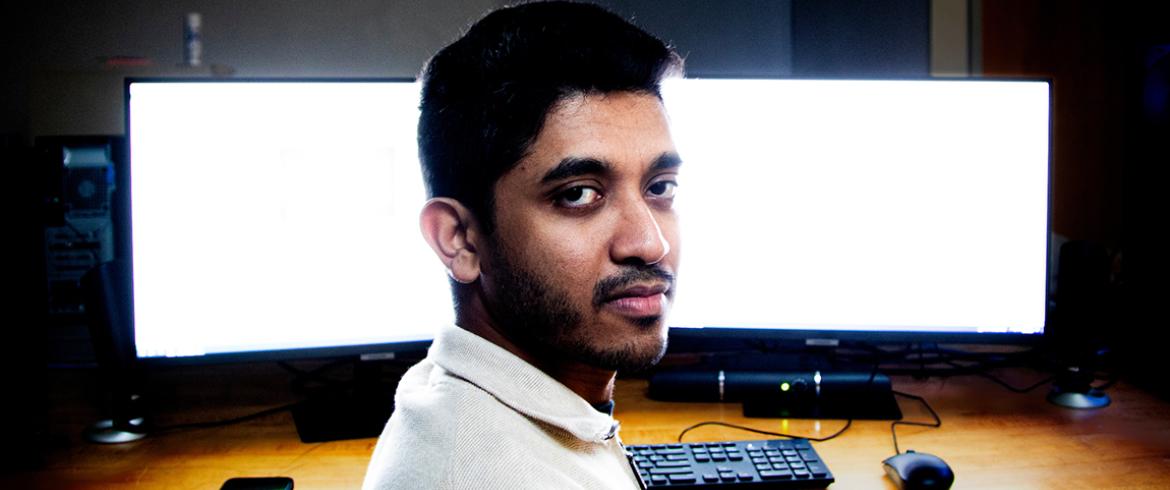
Electrical and Computer Engineering PhD student Migara Amarasinghe was recognized by Intel for his research on heterogeneous computing. (M Wallheiser/FAMU-FSU Engineering)
Graduate Student Spotlight
Migara Amarasinghe has always been fascinated by the inner workings of computers.
Originally from Kurunegala, Sri Lanka, Amarasinghe will graduate in 2024 from the nation’s joint college and Florida State University. The electrical and computer engineering doctoral candidate works as a research assistant in heterogeneous computing and AI and is a teaching assistant in microprocessor-based system design.
He recently worked with Intel as a student ambassador and shared some thoughts about his journey as an engineering student at the FAMU-FSU College of Engineering.
Tell us about your student ambassador experience at Intel.
Being a student ambassador at Intel was a great experience. I worked with Intel professionals and fellow ambassadors and set up a two-day, Intel-funded workshop at the joint college. I also took part in many hackathons that Intel sponsored. Besides these, I helped organize lectures in our classrooms where engineers from the company came to talk. This role as a student ambassador offered me the chance to explore Intel’s latest technological innovations while working closely with their experts.
Talk about your doctoral research.
For my Ph.D., I’m exploring how to use heterogeneity in High-Performance Computing (HPC) systems to improve how we run AI programs and tackle complex computational challenges. This involves using a variety of processors strategically within HPC setups, tailoring them to handle AI tasks and intricate computations more efficiently. The aim is to boost the speed and effectiveness of AI operations on these advanced computing platforms by integrating diverse computational resources.
What is a heterogeneous computing environment?
It’s a computer system that uses different types of processors or cores. Varied components work together to handle tasks more efficiently than a homogeneous system, which uses identical processors. Variety in processing capabilities allows for more efficient and faster computation and is especially useful in complex tasks like data analysis and machine learning.
Why is this important?
Heterogeneous computing is vital because it’s a flexible and efficient way to handle complicated computer tasks. It uses a mix of different kinds of processors with unique attributes. This mix helps us tailor the right resources for each job, making the whole process quicker and saving energy. It is beneficial in areas like artificial intelligence and handling large amounts of data, where the things we need computers to do change and get more complex.

What about your research group?
I appreciate the support from professors Simon Foo and Shonda Bernadin. Working with Dr. Foo has allowed me to explore and learn more about high-performance computing and AI. Our research group includes several talented doctoral students working on innovative AI projects. Meanwhile, Dr. Bernadin got me involved in various community projects. These projects focus on providing opportunities for students who don’t have access to engineering experiences and emphasize the importance of multicultural and all-embracing. We’ve also organized several events and hackathons with top engineering companies, which has been a great experience.
Why did you decide to go to the FAMU-FSU College of Engineering?
I chose the FAMU-FSU College of Engineering because of its dynamic and fast-evolving programs and dedication to academic excellence. These qualities matched well with what I was looking for in a college, making it the perfect place for me.
What inspired your interest in computers?
My interest in computers started with my first Intel Pentium 4. I was interested in its fast-computing power and how things worked. Ever since I was young, I’ve enjoyed putting together computer parts. I’ve always been curious about the hardware and all the different things you can do with technology.
Do you have any hobbies?
Music has been a big part of my life since I was young. I’ve had success in many singing and instrumental competitions. When I was a teenager, my love for music made me start a rock band with my friends from school. Now, I’m in a rock band here in Tallahassee. We perform at events at FSU and around the city. This musical path has been great alongside my studies, giving me a fun and creative way to express myself.
What are your plans after graduation?
I plan to work in the industry, focusing on high-performance computing and accelerated AI. I want to apply the principles of heterogeneous computing to create more powerful and efficient computing systems, aligning my career with the cutting edge of technological advancement.
RELATED ARTICLES
Sarah Birchell uncovered her true engineering interests
Electrical engineering professor receives Florida A&M University’s 2021 Research Excellence Award
